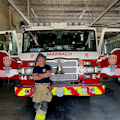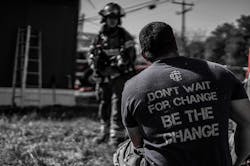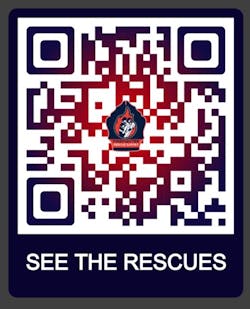“Thank you for your service.”
Like most of you who are reading this, I have heard and read these words more times than I can count. Often accompanied with a firm handshake and a friendly smile, these words don’t tend to break beyond the surface. However, I was touched deeply when the same gratitude was expressed to me by a happy child when I found a favorite toy in the car at a motor vehicle accident, by a wife who watched my crew and me try all that we could to revive her husband of 50 years and by a teary-eyed father who did all that he could to be strong for his family whose house caught fire.
The times that we are exposed to these exceptional moments are far fewer than those that involve the normal thankful citizen who we come across at the grocery store. That said, the “thank you” that we receive in the grocery store presumes that we will perform our duty in the moment of need and that, until called on, we constantly train and prepare and are in a state of readiness to earn the emotional “thank you” that follows our actions.
Who we serve
The public expectation of firefighters is one of the highest that I have encountered. We are expected to solve all problems at any hour. We are trusted and admired. We are an honored profession and have kept our reputation through centuries.
Firefighters are expected to be physically fit, compassionate and educated, to think critically, and to put the safety and life of others before their own. We are accountable to the citizens to meet these expectations and to keep the oath that we swore to be willing to give the ultimate sacrifice in the effort to save others.
Somewhere along the way, we lost this. We became so overly concerned with firefighter safety that we forgot that we are a profession of service and that citizens always come first.
We must base every decision that we make around the people who we serve and who we swore to protect.
At structure fires, we must get inside and get them out! The priority at every structure fire is rescue. There’s no way of knowing that it isn’t a rescue until we get inside and search.
Stop calling buildings “vacant” until they are searched. Get inside!
Stop profiling survivability. Get inside!
Stop spraying exterior water “quick hit” on interior fire. Get inside!
Stop asking for water supply before searching for people. Get inside!
Stop dedicating companies to utilities before search. Get inside!
Get the first line in place quickly and efficiently to support and protect the primary search. It’s our job to give people every chance to survive. That isn’t accomplished in the front yard.
We are in a race against time at every fire, and chances of survivability diminish every second that we delay primary search and interior fire attack. Stop hiding behind fear, falsified data and exaggerated risk profiling. Negligence due to complacency is inexcusable. Avoidance isn’t a substitute for competency. This is an accountability call.
Make the change today. Build a foundation of good habits, expectations and standards. You chose them. The public calls on us and doesn’t get to choose who responds. They expect that, no matter where they are in the country, that when they dial 9-1-1 and ask for firefighters, they are getting the best. Our goal every time that we step on the rig should be to meet that standard. This takes hard work, motivation and discipline.
We are owed nothing. We are blessed with the ability to work at the best job in the world, because the public affords us the opportunity. We swore to uphold the oath, not until we get off of probation or until we promote, but as long as we are on the job. We are accountable to them.
That said, we all want the LODD number to be zero every year. However, the harsh truth is that our job is dangerous, and we risk our life doing it. We all knew that when we signed up. If there are lives to be saved, we have our life to risk.
Continued growth
I care immensely about the safety of myself and fellow firefighters, and the greatest dishonor lies in not learning and growing from those who gave their life. The safest action that we can take is to be well trained and mentally prepared. Here are 14 building blocks for your crew foundation.
- Set defined expectations for every member
- Check every inch of the apparatus every shift
- Train daily with no excuses
- Exercise and eat better
- Hustle to calls and gear up for fire alarms
- Dedicate a portion of the day solely to job only
- Read, read, read
- Pick a subject and create a class to give your crew
- Get in gear often to acclimate
- Go to outside training and learn from new perspectives
- Surround yourself with like-minded people
- Make sets and repetitions infinite on the basics
- Attack your weaknesses and sharpen your strengths
- Never walk past a problem that you can fix
These are only a few of many, but I hope that they provide a step in the right direction. It never is too late. Have that talk at the kitchen table. The people deserve it. Show pride and passion in all that you do.
We must continue the growth of the fire service. Remember that, above all else, we are here for them through sworn duty of selfless service.
Take the Firefighter Rescue Survey by scanning the QR cade.
About the Author

Daniel Drury
Daniel Drury has been a firefighter for the San Antonio Fire Department for four years, and he is a mentor for the department's probationary firefighters. Drury is lead instructor for MV Fire Rescue TX, which is a firefighter-owned and -operated company that specializes in rescue products and training. He has been featured on multiple podcasts, including The Rogue Tailboard podcast, and on Facebook Live for Salty Coast Fools. Drury served in the U.S. Marine Corps, including deployment to Afghanistan.

